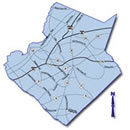Civil Post Judgment - Forms
Sheriff Entry of Service(MAG 10-10)
The Gwinnett County Sheriff's Entry of Service form is the document used to show service of process upon the defendant or garnishee. The fee for serving a summons by the sheriff's deparment can be found on the Magistrate Fee Page.
The Magistrate Court version of this form can also be modified to show proof of service of other documents also served by the sheriff's deputies.
 |
Sheriff Entry of Service [DOC] |
Post-Judgment Collection Procedures(MAG 14-01)
Purpose of form:
To give a brief overview of various post-judgment collection procedures available to judgment creditors.
Many "pro se" litigants, lay persons, have the mistaken belief that "the court" will collect any judgment that may be entered in their behalf. That belief is inaccurate. Courts could not legally fulfill their constitutional duty of impartiality in all proceedings if a court was to act as an agent on behalf of any party, including post judgment collection proceedings.
Post judgment collection is the responsibility of the judgment creditor. MAG 14-01 gives an outline various judicial and non-judicial remedies that a judgment creditor may employ to collect the monies awarded to them in a civil case.
Other:
Law Library: Georgia Post Judgment Collection, Finestone's & Cardon's, The Harrison Company.
Cooperman's Georgia Collection of Accounts; Adams; The Harrison Company;
Post Judgment Collection- Seminar; I CLE; (1997) KFG551.A75P857.
15-10-50. Propounding of interrogatories to judgment debtor; form; contempt; authorized discovery procedures.
- (a) In aid of any judgment or execution issued by any court in this state upon which the unpaid balance does not exceed the jurisdictional amount for civil claims in magistrate court as provided in paragraph (5) of Code Section 15-10-2, the judgment creditor or his successor in interest when that interest appears of record, may, in addition to any other process or remedy provided by law, examine the judgment debtor by propounding the interrogatories specified in this Code section in the manner provided in this Code section.
- (b) If the judgment or execution concerning which interrogatories are being propounded was issued by the magistrate court the judgment creditor may, after the entry of judgment, file the form interrogatories specified in this Code section with the clerk of the same magistrate court, along with costs of $10.00. Interrogatories filed under this subsection shall be served upon the judgment debtor by certified mail or statutory overnight delivery.
- (c) Interrogatories propounded pursuant to a judgment entered in any other court shall be filed as a new civil action and shall be accompanied by the filing and service fees required for civil actions in that magistrate court. Interrogatories propounded under this subsection shall be served upon the judgment debtor in the manner provided for service of process in civil actions in magistrate court. ....
- (e) The court in its discretion may limit the number of times interrogatories may be propounded upon a judgment debtor, may relieve a judgment debtor of the obligation to answer one or more propounded interrogatories, and may for good cause shown enlarge the time for answering any interrogatory. The court may if necessary compel the answering of interrogatories, but the sanction of contempt shall be applied only after notice and an opportunity for hearing and a showing of willful failure to answer or willful failure to answer fully and truthfully.
- (f) An evasive or incomplete answer to an interrogatory shall be treated as a failure to answer.
- (g) Notwithstanding the provisions of Code Section 15-10-42, the judgment creditor or a successor in interest when that interest appears of record may, in addition to any other process or remedy provided by law, utilize the discovery provisions set forth in Code Section 9-11-69.
9-11-69. Execution; discovery in aid thereof.
Process to enforce a judgment for the payment of money shall be a writ of execution unless the court directs otherwise. In aid of the judgment or execution, the judgment creditor, or his successor in interest when that interest appears of record, may do any or all of the following:
- Examine any person, including the judgment debtor by taking depositions or propounding interrogatories.
- Compel the production of documents or things.
- Upon a showing of reasonable necessity, obtain permission from a court of competent jurisdiction to enter upon that part of real property belonging to or lawfully occupied by the debtor which is not used as a residence and which property is not bona fide in the lawful possession of another; in the manner provided in this chapter for such discovery measures prior to judgment.
 |
Post-Judgment Collection Procedures |
Directions for Post Judgment Interrogatories(MAG 14-03)
Purpose of form:
The below listed checklists give you the costs as well as a description of the 3 step process connected with post judgment interrogatories.
 |
Directions for Post Judgment Interrogatories |
Post Judgment Interrogatories and Notice(MAG 14-05)
Answers to Post Judgment Interrogatories(MAG 14-06)
| Answers to Post Judgment Interrogatories [DOC] |
Motion to Compel Answers to PJ Interrogatories(MAG 14-07)
Notice of Hearing on Motion to Compel Answers(MAG 14-08)
Ten Day Order(MAG 14-10)
Motion to Incarcerate Debtor or Corporate Officer(MAG 14-11)
Notice of hearing on motion to incarcerate(MAG 14-12)
Order on Motion for Contempt(MAG 14-14)
Order Releasing Debtor From Incarceration(MAG 14-15)
FAQ on how to perfect judgment lien or levy upon motor vehicles.(MAG 14-32)





